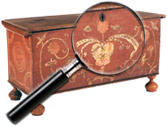The Scinde pattern is classified by Jeffrey B. Snyder as “Most sought after/Very Expensive” in his 1995 book “A Pocket Guide to Flow Blue” issued by Schiffer Publishing, Ltd.
|
|||||||
|
The Lonsdale pattern is classified as “Available/Can by Completed” by Jeffrey B. Snyder in his 1995 “A Pocket Guide to Flow Blue” issued by Schiffer Publishing Ltd. The Japan pattern is classified by Jeffrey B. Snyder as “Least Expensive/Harder to Find” in his 1995 book “A Pocket Guide to Flow Blue” issued by Schiffer Publishing, Ltd. The Birmingham forgeries are very deceptive and others have sometimes been used unknowingly as illustrations of real stamps in stamp catalogues and albums! The bamboo pattern is classified as “Least Expensive/Harder to Find” by Jeffrey B. Snyder in his 1995 “A Pocket Guide to Flow Blue” issued by Schiffer Publishing Ltd. The Alaska pattern is classified by Jeffrey B. Snyder as “Available/Can be Completed” in his 1995 book “A Pocket Guide to Flow Blue” issued by Schiffer Publishing, Ltd. The Amoy pattern is classified by Jeffrey B. Snyder as “Most sought after/Very Expensive” in his 1995 book “A Pocket Guide to Flow Blue” issued by Schiffer Publishing, Ltd. The Abby pattern is classified by Jeffrey B. Snyder as “Available/Can be Completed” in his 1995 book “A Pocket Guide to Flow Blue” issued by Schiffer Publishing, Ltd. Uncovering the Story of “Texian Campaigne” Pattern Transferware During the 19th century the English potteries centered in the county of Staffordshire developed a thriving business in transferware. The excellent Transferware Collectors Club website (www.transcollectorsclub.org) describes transferware as “the term given to pottery that has had a pattern applied by transferring the print from a copper plate to a specially sized paper and finally to the pottery body.” Originally the sturdy utilitarian wares, which included [...] Click here to continue reading. Karl Emil Termohlen (1863-1938) Karl Emil Termohlen was born in Copenhagen, Denmark into a family of distinguished artists and later moved to America and established himself in the Chicago, Illinois, area. Soon after his arrival in America he gained acceptance as a recognized artist of tonal landscapes and had works accepted and displayed both in the Philadelphia Academy of Fine Art and the Art Institute in Chicago. One of his pictures took a prize [...] Click here to continue reading. |
|||||||
|
Copyright p4A.com, ltd. & Internet Antique Gazette - 2026 - All Rights Reserved |
|||||||
